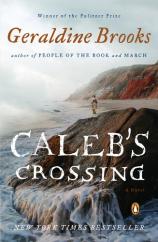Caleb's Crossing
Review
Caleb's Crossing
Geraldine Brooks's latest historical novel, CALEB'S CROSSING, opens with a facsimile of a letter written by Caleb Cheeshahteaumauk to the English benefactors who sponsored his education at Harvard University. Written in Latin, faded and nearly indecipherable, the letter nevertheless confers an air of authenticity to a story that might otherwise seem too outlandish to be true.
As if Brooks needs additional historical credentials. In her previous novels, including the beloved YEAR OF WONDERS, she has aptly proven her ability to blend historical accuracy and outstanding research with contemporary perspective and genuine storytelling skills. CALEB'S CROSSING is no exception.
The novel opens in 1660, in Great Harbor (now Edgartown), Martha's Vineyard, an island off the coast of Massachusetts better known today for its summer cottages and presidential vacations than for its pre-Revolutionary history. But, Brooks reminds us, the Vineyard is as steeped in history as the rest of the United States. Settled by the Wampanoag Native American tribe, Martha's Vineyard is also home --- far more recently --- to a handful of English colonists. Some of them seize on the land's limited potential for farming; others grab onto the potential for whaling. For young Bethia Mayfield's father, the son of a wealthy landowner who operates much of the island like a feudal estate, the attraction is a spiritual one. His mission is to convert the natives to Christianity, a task he's finding more than a little frustrating.
Almost as frustrating to Bethia's father is the task of educating his slow, obdurate son Makepeace. Bethia, who's as sharp as a tack, easily learns history and languages just by overhearing her father's tutoring of her dim-witted older brother, even though she's forbidden to actually learn them herself. She even picks up the notoriously difficult Wampanoag language, a fact she keeps secret from her father but that she uses to her advantage when she meets the compelling Indian boy she re-christens "Caleb." Caleb may be destined to be a powerful prophet and healer for his people, but to Bethia he's also both an enticing Other and a genuine friend. She teaches him English, and he teaches her the lore of the island and a growing skepticism for the absolute rightness of her father's Christian religion. But when smallpox decimates Caleb's tribe, he embraces Bethia's father's teachings as a means to become a different sort of scholar and healer.
After a series of tragedies threatens to destroy Bethia's family, she finds herself accompanying not only Makepeace but also an increasingly scholarly Caleb to Cambridge, Massachusetts, where the recently-founded Harvard University pledges to instruct both English and Native young men. What all of them find there is far from what any of them would have expected, and an older, wiser, more sober Bethia eventually comes to reflect on those times with a perspective burnished by loss.
Bethia and Caleb's stories share interesting parallels, particularly when viewed through a contemporary reader's lens. Caleb's maleness trumps his native background, giving him opportunities that Bethia will never see for herself. And, of course, there's the modern-day reader's somber knowledge that the naïve good intentions of people like Reverend Mayfield will result in hundreds of years of bloodshed far beyond the conflicts outlined in Brooks's novel.
As a saga of jealousy, of thwarted passion, of religious difference, of potential never reached, CALEB'S CROSSING tells a universal tale. As an historical novel grounded in a particular time and place, it tells a very specific one --- a story that becomes even more remarkable upon reading in the author's afterword that Harvard is poised, in 2011, to graduate only its second-ever Martha's Vineyard Wampanoag tribe member.
Reviewed by Norah Piehl on May 16, 2011
Caleb's Crossing
- Publication Date: April 24, 2012
- Genres: Fiction
- Paperback: 336 pages
- Publisher: Penguin (Non-Classics)
- ISBN-10: 0143121073
- ISBN-13: 9780143121077





